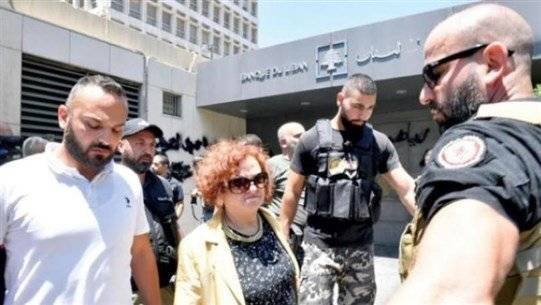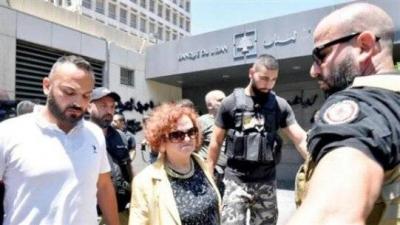The incident involving the public prosecutor in Mount Lebanon, Judge Ghada Aoun, storming the headquarters of the Banque du Liban in Hamra, Beirut, and attempting to arrest the governor of the central bank, Riad Salameh, in execution of a summons she issued weeks ago, has resonated politically and judicially. This raid caused considerable disruption in the banking sector and led to a strike by central bank employees, and it seems that it will not go unaccounted for. The public prosecutor in Beirut, Judge Raja Hamouch, has compiled a detailed report about the facts of the raid and the violations it entailed, which he will submit to the Attorney General, Judge Ghassan Ouyidat.
Legal and judicial circles are awaiting the actions that the relevant authorities in the corridors of the Palace of Justice in Beirut will take. A prominent judicial source confirmed to "Asharq Al-Awsat" that Ouyidat "will study Judge Hamouch's report and determine whether he will take action against Judge Aoun on his own as her immediate supervisor, or refer the matter to the Superior Judicial Council to inform them of the facts of what happened regarding Judge Aoun's exceeding her role and authority, executing raids in Beirut outside of her jurisdiction, and the risks associated with raiding a state institution as significant and symbolic as the Banque du Liban."
While legal and judicial references agree that the judge affiliated with the President of the Republic exceeded her powers, the judicial source noted that Ghada Aoun "committed a fault that warrants accountability, as it is unreasonable for the state to raid its own institutions and place them under suspicion." He revealed that "the officer in charge of the security forces in charge approached the Banque du Liban (on Tuesday morning) based on indications from the public prosecutor in Mount Lebanon and contacted Judge Raja Hamouch, informing him that he was about to execute a raid on the central bank in implementation of Judge Aoun's summons. Hamouch replied that he could not raid the central bank, but he could bring a witness and enter with him to record a report depending on whether the governor had been notified or not."
The source added that "after a few minutes Judge Aoun called the public prosecutor in Beirut, Raja Hamouch, and informed him that she had arrived at the Banque du Liban and was about to raid Riad Salameh's office. Hamouch responded by reminding her that she is not a law enforcement officer to carry out the raid and clarified that he allowed the officer to execute a defined assignment with a witness and to record what occurs between them, and that she is not permitted to enter the premises of the bank under any circumstances, as this is subject to legal and procedural requirements that must be met."
In the context of monitoring the mission of the security forces, the judicial source clarified that Judge Hamouch "contacted the officer in the state security after about half an hour and asked him if he had completed his mission. The officer informed him that Judge Aoun had entered the bank and was currently on the same floor as the governor's office and wanted to interrogate all employees present in that floor and search the offices and safes." At this point, Judge Aoun grabbed the officer's phone, turned on the loudspeaker, and spoke with Judge Hamouch, saying: "I informed you that I would enter the central bank and I want you to come immediately to assist me with the investigation and to arrest Riad Salameh." Hamouch warned her that she was violating the law and encroaching on the authority of the public prosecution in Beirut, and asked her: "Would you accept if I were to execute a specific mission in Mount Lebanon?" He urged her to leave the Banque du Liban immediately, or she would bear the responsibility for the consequences, "and if you do not like my signal, you may refer to the Attorney General and obtain his approval."
The source noted that Judge Hamouch "called the officer and ordered him to leave the Banque du Liban immediately. He complied with the order and left promptly, leaving Judge Aoun, who then departed alone." Information indicates that the results of this raid will leave a negative impact for several days, particularly as the strike announced by the workers' syndicate in the Banque du Liban for three days is already showing adverse effects, evident through the halt of operations on the "Sayrafa" platform and the suspension of clearing between the central bank and commercial banks, which will inevitably lead to a significant rise in the exchange rate of the dollar in the black market.




